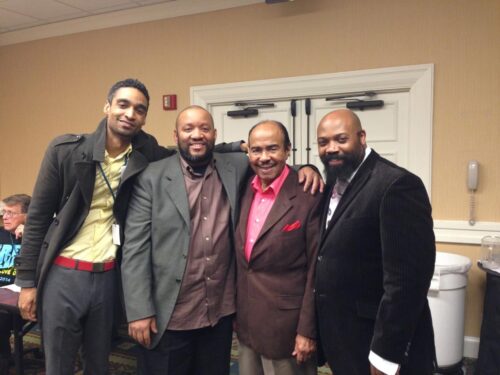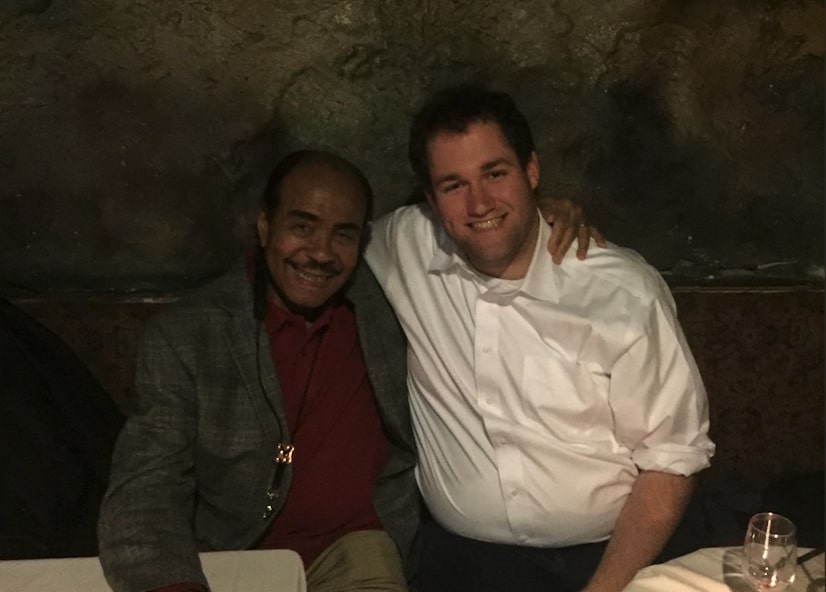When saxophonist, composer and NEA Jazz Master Benny Golson passed away on Sep. 21, he left a significant hole in the global jazz world. He also left a sizable gap in the fabric of the D.C. jazz community; a onetime Howard University student, Golson appeared frequently in town throughout his life, and many musicians, journalists and promoters here had known and worked with him over the years. Golson’s affinity for D.C. began when the budding young saxophonist arrived at Howard from Philadelphia in the mid-1940s to study music.
Golson would become a staple of D.C. jazz clubs like Bohemian Caverns and later Blues Alley. As his prominence grew, Golson was known for not only employing the city’s local jazz musicians at these gigs, but also taking them under his wing, especially in the last two decades of his life. Drummer John Lamkin III, who performed with Golson frequently – often alongside bassists Corcoran Holt or Kris Funn, who each remember him with their own words below – referred to the saxophonist as “Uncle Golson” in a social media post after his passing.
An erudite talker with a humorous and courtly personality, Golson by that point was known for having one of jazz’s most distinctive musical touches — as a composer as well as a saxophone player. He had been the lead composer for Art Blakey and the Jazz Messengers, contributing such now-classic tunes as “Along Came Betty,” “I Remember Clifford” (for his friend Clifford Brown, who had died in a car accident) and “Whisper Not.” He would also co-lead the Jazztet with Art Farmer, and enjoyed a successful career as a solo bandleader from the late 1950s onward.
Though never a local D.C. musician, he was the next-closest thing, forging deep institutional ties with Howard (where he had left in 1949, shy of a bachelor’s degree) thanks to Professor Fred Irby III, who worked to establish a jazz prize in his name there. We asked a few pillars of the D.C. jazz scene — four musicians and a veteran broadcaster — to recall their memories of Mr. Golson and to share the significant impact he had on their lives and the rest of our jazz town.
CORCORAN HOLT
Bassist

He was incredible. The stories, the information he would have. He wrote so many tunes, so many standards, that when you play those standards with Benny Golson — “Along Came Betty” or “Killer Joe” or “I Remember Clifford” — it always felt different. There was a lot of depth to it because he could explain exactly why he wrote the song, what was going on in his life at the time. … He was like a gentleman’s gentleman; they don’t really make it like him [anymore]. He was very articulate, both verbally and also on the horn. He knew what he liked, he knew what he wanted.
Man, I just feel extremely blessed just to have been in the same room as him, but also to make music with him the amount of times I was able. Even if it was just one time, to be around a master like that just set the tone for every day in my career. Those moments inspire me and make you want to push, to live up and be as great as he is. Ninety-five years old – and he left such a legacy. We’re gonna definitely miss him, but it was a job well done.
ALLYN JOHNSON
Pianist
First time I played with him I was kind of nervous, because it was Benny Golson, and you want to play all his music correctly! After the first rehearsal, we played tunes; he was happy. [Then] we got to “Killer Joe” and I’m playing the correct chords but I’m not playing the correct voicing. There’s a specific voicing that the piano player is supposed to play and he’s like, “No, no, you gotta play it this way.” It’s with a C-octave plus a fifth in the middle on top of the chord. He said, “You gotta play it that way all the time because that’s how people know the song.” It was a specific way that you had to play it, so I learned something that day.
He was an example of, “It takes more than musicianship to be a great musician.” It takes being a professional, it takes being a nice person, and it takes class along with the musicianship and practicing and knowing your instrument and all of that.
RUSTY HASSAN
Disc jockey
When I came to D.C. to attend Georgetown University, I got a jazz show on WGTB and used to play Benny Golson’s music with Art Blakey’s Jazz Messengers and with the group he co-led with Art Farmer, the Jazztet. I continued to play his music on the air for years to come on WAMU, WDCU and WPFW. … I’m trying to remember the first time I saw him perform in person. One time was with the new version of the Jazztet with Art Farmer at Charlie’s in Georgetown. I was shocked at how slight the audience was for these important artists. But he was as gracious as ever with the introductions and stories, and the performance was superb. Subsequent performances that I attended at other venues, such as Bohemian Caverns and the Kennedy Center, were packed as they should have been.
I’ll always be grateful to Paul Carr for asking me to interview Benny Golson at the Mid-Atlantic Jazz Festival. It was undoubtedly the most delightful interview I’ve ever had. He told stories of growing up in Philadelphia with John Coltrane and the struggles they had getting gigs. He gave us the rationale for the titles of his music, the tragic accident that took the life of Clifford Brown and how he wrote I Remember Clifford. The Betty in “Along Came Betty.”
I was happy to see Fred Irby in attendance that day. As the director of the Howard University jazz program, he had worked hard to get the university to recognize its former student, who was unable to play jazz in the college when he was enrolled there. In the 1990s he honored Benny Golson with a university award that became titled the Benny Golson Jazz Master Award, and which numerous musicians and jazz advocates have been honored with since. Fred’s persistence finally persuaded Howard University to bestow an honorary doctorate on Benny Golson. I feel really fortunate to have seen perform and had conversations with a jazz artist that grabbed me when I heard him on record as a young teenager — and doubly so, to have been honored with an award in his name.
KRIS FUNN
bassist

He was the epitome of class. A lot of musicians, especially of his age and stature, would seem to make it their mission to indoctrinate younger musicians to what the music should be. I never experienced any of that from him. You would think being one of the most prolific composers of his time would [mean he’d] have a certain air about him, but he always ran a welcoming bandstand and encouraged musicians to search and find themselves in the music
I remember being a nervous wreck the first few times I performed with him. He had a great way of making the musicians in his band feel welcomed and empowered by joking with the audience about how great you were. I barely ever like to take more than two choruses of a bass solo, but I remember the first time I played a solo he was vocally cheering me on to the audience and then told me to keep playing into another chorus. I’m not sure if he thought anything of what I was playing at the time, but showing the audience that he was in my corner truly took the weight of playing with a master off of my shoulders.
FRED IRBY III
Trumpeter and educator
When he was named an NEA Jazz Master, given the fact that he’d gone to Howard — even though he left the school and didn’t graduate — I went over to the Board of Trustees’ office and the secretary of the board, and I asked them if they could give Benny Golson a honorary doctorate in music, because he’s the most famous former students we have in jazz from Howard University. At the time, the person in charge had never heard of him … and they told me we need to advocate more for him, so that people know more about him. I decided I would call Benny Golson up and invite him to campus to play in 1996. During that time I told him we were going to create an award in his honor. So, we created the Benny Golson Jazz Master Award, and he got the first one. … We’ve since given it to over 80 people and institutions.
So he came and played. He told me at that time that he hadn’t been on this campus in 40 years, and he was kind of bitter when he left, but he was so happy we brought him back and honored him. I told him that as long as I was at Howard I was going to give this award every year.
We talked about two weeks before his death, because we would talk every month, or every other month. … He would call me sometimes out of the clear blue sky because he just wanted to talk. I knew he was sick but I was just hoping he would keep going. I’m going to his service on Oct. 12 in New York City. I really miss him, and I love him too. That award, we’ve been doing it for 28 years. I’m glad I got the chance to tell him at least three or four times a year how much we love him. With people like that, we tend to honor them when they’re dead, but we honored him for 28 years. That’s probably the best thing I’ve done since I’ve been at Howard.









Join the Conversation →